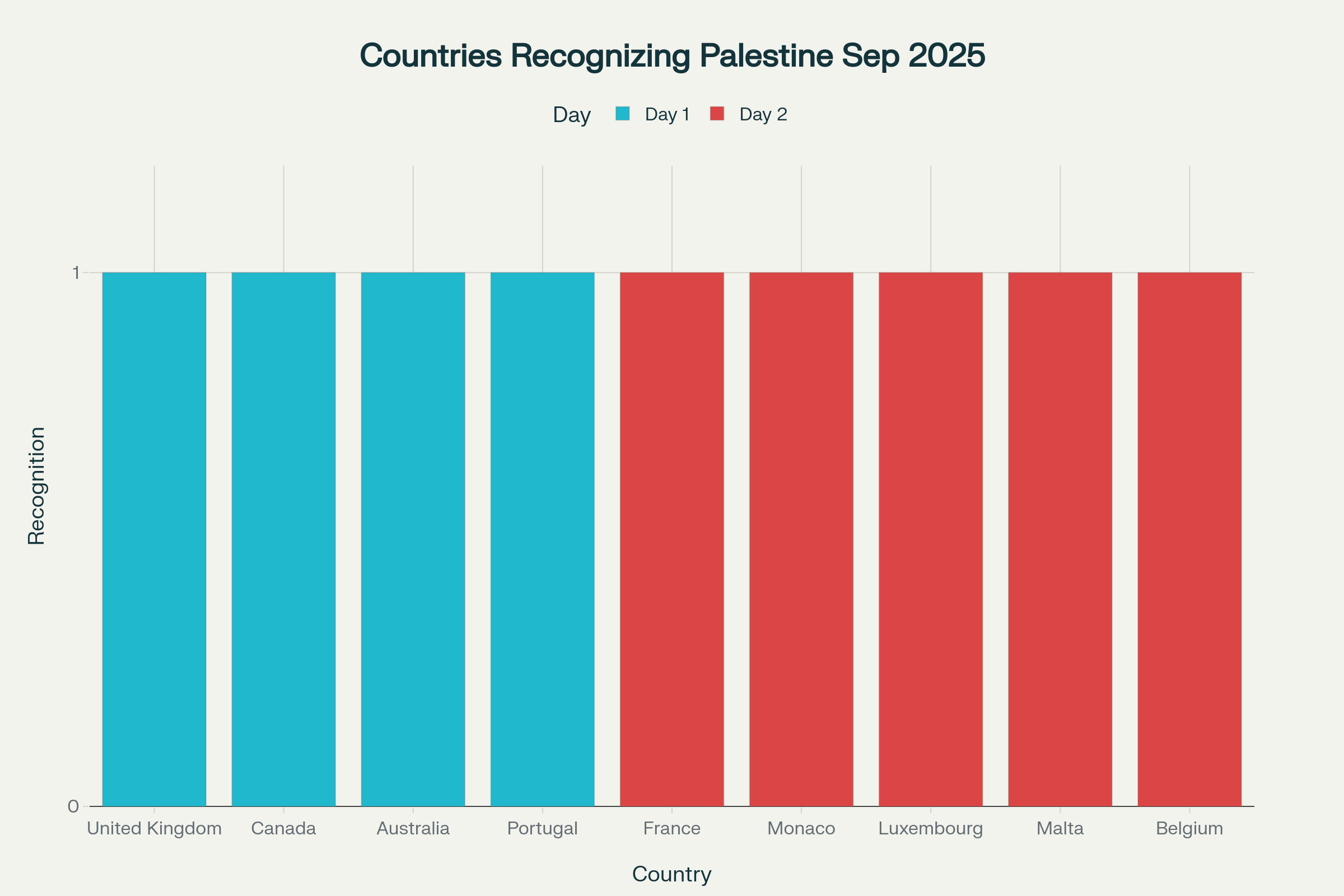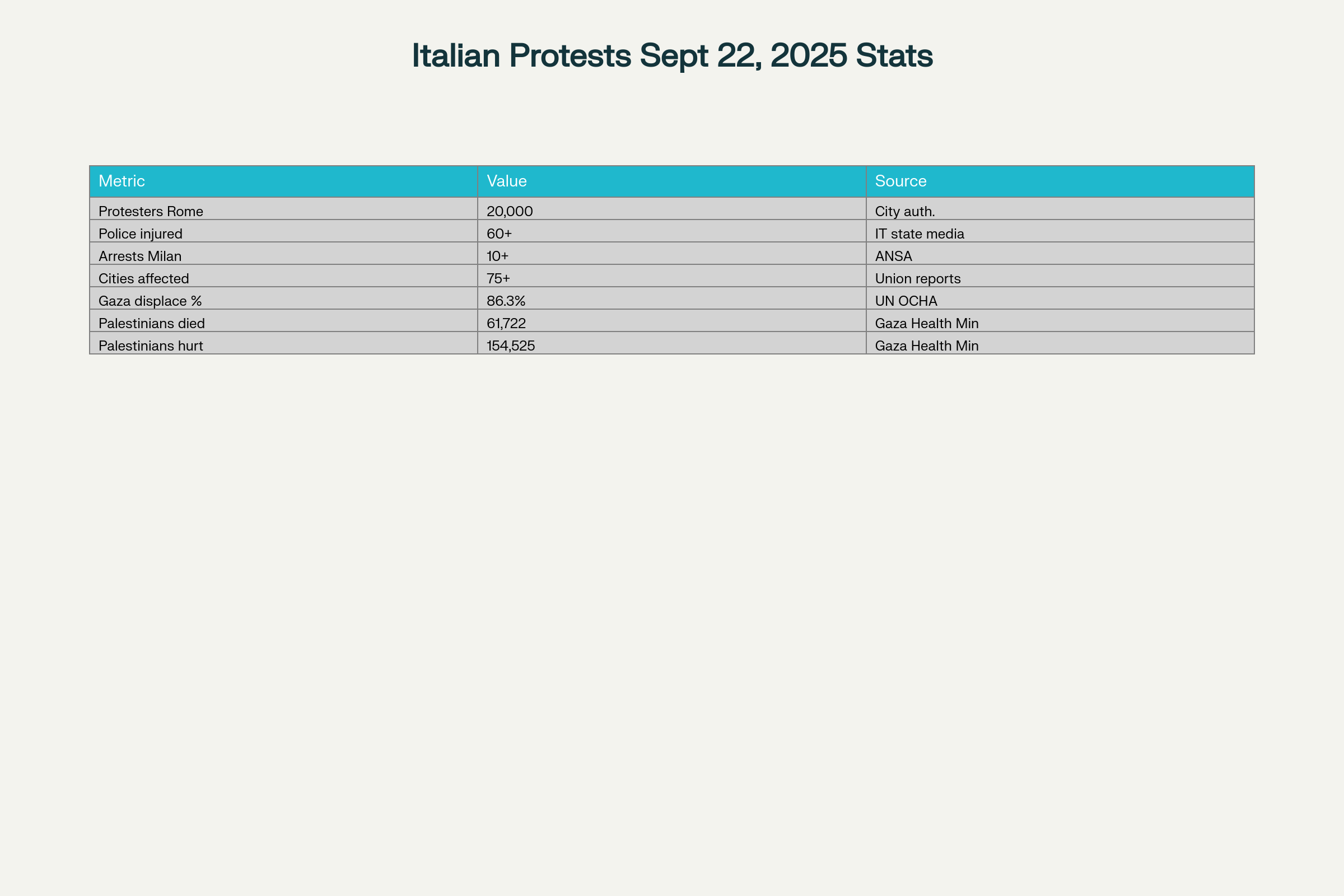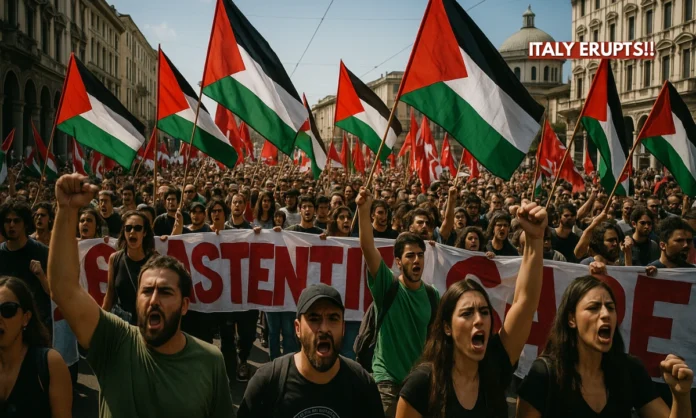Tens of thousands of pro-Palestinian protesters clashed with police across Italian cities on September 22, 2025, as nationwide strikes brought Italy to a standstill following Prime Minister Giorgia Meloni’s refusal to recognize Palestinian statehood amid a global wave of recognition.
Italian Pro-Palestinian Protests: Key Highlights
- Over 100,000 participants joined nationwide strikes across 75+ Italian cities, causing widespread disruption to transport, education, and port operations
- Violence in Milan injured 60+ police officers and led to 10+ arrests as protesters smashed windows and threw objects at law enforcement
- Italy stands isolated as 156 countries now recognize Palestine, with 9 nations formally recognizing Palestinian statehood in just two days during the UN General Assembly
Italian Pro-Palestinian Protests: Widespread Civil Unrest Grips Major Cities
The Italian Pro-Palestinian protests on September 22, 2025, marked one of the largest coordinated demonstrations in recent Italian history, with labor unions organizing a comprehensive 24-hour general strike under the banner “Let’s Block Everything”. The demonstrations directly targeted Prime Minister Giorgia Meloni’s government for refusing to join the international consensus recognizing Palestinian statehood.
In Milan, Italy’s financial capital preparing to host the 2026 Winter Olympics, scenes of intense violence unfolded at the central railway station where Italian Pro-Palestinian protests turned destructive. Police in riot gear deployed tear gas against demonstrators dressed in black who wielded poles to smash station windows and hurled chairs at law enforcement officers. The clashes resulted in over 60 injured police officers and more than 10 arrests, according to Italian state media reports.
Rome witnessed the largest single gathering with approximately 20,000 protesters assembling outside the Termini railway station before marching through the capital’s streets. The demonstration effectively blocked major ring roads while participants displayed Palestinian flags and chanted “Free Palestine” slogans throughout the march.
Bologna experienced highway blockades where Italian Pro-Palestinian protests stopped vehicle traffic before confrontations with police led to water cannon deployment for crowd dispersal. Similar scenes played out in Naples, where protesters forced their way into the main railway station and briefly occupied train tracks, causing significant service delays.
24hrs after the snake Starmer decided to recognise the terror state of "Palestine".
— Tommy Robinson 🇬🇧 (@TRobinsonNewEra) September 22, 2025
Today Meloni's government were asked to do the same, they refused.
And now this is the scenes in Milan.
Never negotiate with terrorists, nevermind give them all they want! pic.twitter.com/onkTs0U2eV
Italian Pro-Palestinian Protests: Strategic Port Blockades Target Military Supply Lines
- Dockworkers in Genoa, Livorno, Trieste, and Venice implemented coordinated port blockades to prevent weapons transfers to Israel
- Venice authorities deployed water cannons to disperse protesters attempting to shut down port operations
- The strikes targeted Italy’s role as a potential transit hub for arms and supplies reaching Israel during the Gaza conflict
Italian Pro-Palestinian protests specifically focused on disrupting maritime trade routes, with dockworkers expressing determination to prevent “not a nail, not one container” from reaching Israel. The port blockades represented a strategic component of the broader protest movement, targeting Italy’s economic and logistical connections to the ongoing Gaza conflict.
Trade unions justified the port actions by citing Italy’s potential role in facilitating military supply chains, despite the government’s claims that no Italian weapons have been sold to Israel since October 7, 2023. The coordinated nature of these blockades across multiple major ports demonstrated the organized resistance to Italy’s current foreign policy stance.
Italian Pro-Palestinian Protests: Meloni’s Isolation Amid Global Recognition Wave
Prime Minister Giorgia Meloni’s position has become increasingly isolated as the international community rapidly embraces Palestinian statehood recognition. During the September 21-22 period at the UN General Assembly, nine countries formally recognized Palestinian statehood, bringing the total to 156 nations – approximately 80% of UN member states.
The recognition cascade began on September 21 when the United Kingdom, Canada, Australia, and Portugal announced their decisions, followed by France, Belgium, Monaco, Luxembourg, and Malta on September 22. This diplomatic momentum directly contrasted with Meloni’s steadfast refusal to follow suit, despite Italy voting in favor of Palestinian statehood at the UN earlier in September.
Meloni’s July 2025 statement defending her position argued that recognizing a Palestinian state before its establishment could be “counterproductive” and might create false perceptions that the issue is resolved. Her administration maintains ideological alignment with President Trump’s policies while expressing concern about Israeli military actions in Gaza.
The Italian Pro-Palestinian protests reflected growing domestic pressure on Meloni’s government, particularly from left-wing opposition parties criticizing her failure to explain her Gaza policy positions in parliament. The demonstrations coincided with mounting international pressure as the Gaza conflict approaches its two-year anniversary next month.

Italian Pro-Palestinian Protests: International Diplomatic Momentum Accelerates
The UN General Assembly period witnessed unprecedented momentum for Palestinian recognition, with the New York Declaration on the two-state solution receiving support from 142 of 193 UN member states. Only Israel and nine other countries, including the United States, Argentina, and Hungary, voted against the declaration, while 12 nations abstained.
French President Emmanuel Macron’s announcement of Palestinian recognition described the decision as a “necessity” for establishing sustainable peace and the beginning of a comprehensive political process. The coordinated timing of multiple recognitions during the UN General Assembly amplified the diplomatic pressure on holdout nations like Italy.
Israeli Prime Minister Benjamin Netanyahu strongly condemned the recognition wave, describing it as a “reward for terrorism” and Hamas, while Israel’s UN envoy dismissed the developments as a “circus”. The United States, under President Trump’s administration, maintains opposition to Palestinian recognition, with Secretary of State Marco Rubio previously calling France’s recognition plans “reckless”.
The diplomatic shift represents a significant challenge to the traditional Western alliance position on Palestinian statehood, with major US allies including the UK, Canada, and Australia breaking ranks to support recognition.
Italian Pro-Palestinian Protests: Gaza Crisis Fuels Protest Intensity
The Italian Pro-Palestinian protests occurred against the backdrop of devastating humanitarian conditions in Gaza, where official UN data shows 61,722 Palestinians killed and 154,525 injured as of August 13, 2025. The conflict has displaced approximately 1.9 million people – roughly 90% of Gaza’s population – with many experiencing multiple displacements.
Current humanitarian conditions include severe malnutrition affecting 21.5% of children in Gaza City, meaning nearly one in five young children is malnourished. The UN reports that 86.3% of Gaza remains within Israeli-militarized zones under displacement orders as of August 2025.
Italian trade unions organizing the protests specifically referenced the “ongoing genocide in Gaza” and criticized the Italian government’s inaction regarding humanitarian aid and economic sanctions against Israel. The demonstrations reflected broader European civil society frustration with government responses to the Gaza crisis.
UNRWA has been prevented from bringing humanitarian aid into Gaza for over five months since March 2, 2025, despite warehouses in Egypt and Jordan containing supplies sufficient for 6,000 trucks. These humanitarian restrictions have intensified public pressure for stronger government action across European nations.

Italian Pro-Palestinian Protests: Economic and Social Disruption Spreads Nationally
The Italian Pro-Palestinian protests created significant economic disruption across the country’s transportation and education systems. Public transport experienced major delays, with Milan’s key metro line completely shut down and train services facing extended interruptions throughout the national rail network.
University students in Turin and Bologna blocked access to lecture halls, expanding the protest beyond traditional labor union organizing to encompass academic institutions. The coordinated nature of these actions demonstrated broad social support for Palestinian solidarity that extended across multiple sectors of Italian society.
The strikes affected both public and private sector operations, with particular impact on logistics and shipping industries crucial to Italy’s economy. Port blockades in major commercial hubs like Genoa and Livorno threatened to disrupt Mediterranean trade routes if extended beyond the planned duration.
Government officials estimated that the protest-related damages and service disruptions would result in significant costs for Italian taxpayers, with Prime Minister Meloni specifically criticizing protesters for actions that would have “concrete consequences for Italian citizens”.
Government Response and Political Ramifications
Prime Minister Meloni condemned the Milan violence as “outrageous” and dismissed the protesters as “self-proclaimed pacifists” who engaged in destruction unrelated to Palestinian solidarity. Her social media response emphasized that violence would not change conditions in Gaza but would burden Italian citizens with repair costs and economic disruption.
The government’s response highlighted tensions between Meloni’s far-right administration and opposition parties demanding stronger action on Gaza. Left-wing critics have intensified pressure on Meloni to explain her refusal to recognize Palestinian statehood, particularly given Italy’s UN vote supporting Palestinian state recognition in September.
Meloni’s position reflects broader European Union divisions on Palestinian recognition, with member states split between recent recognition announcements and more cautious approaches. Before Sweden’s 2014 recognition, most EU countries that recognized Palestine did so before joining the union, primarily former Soviet bloc nations.
The Italian Pro-Palestinian protests represent a significant domestic challenge to Meloni’s foreign policy approach, particularly as public opinion appears increasingly supportive of Palestinian recognition amid ongoing humanitarian concerns in Gaza.
Closing Assessment
The September 22, 2025 Italian Pro-Palestinian protests marked a watershed moment in European civil society’s response to the Gaza conflict and Palestinian recognition debate. With over 100,000 participants across 75+ cities creating unprecedented disruption to transportation, education, and port operations, the demonstrations reflected deep public frustration with government inaction on Palestinian statehood recognition.
Prime Minister Meloni’s isolation became starkly apparent as 156 countries now recognize Palestine while Italy maintains opposition despite voting for Palestinian statehood at the UN. The coordinated port blockades and nationwide strikes demonstrated organized resistance to Italy’s current foreign policy stance, particularly regarding potential roles in military supply chains to Israel.
The protests occurred amid deteriorating humanitarian conditions in Gaza, where 86.3% of the territory remains under displacement orders and severe malnutrition affects one in five children. As the Gaza conflict approaches its two-year anniversary, Italian civil society has clearly signaled demand for stronger government action supporting Palestinian rights and recognition of statehood.


